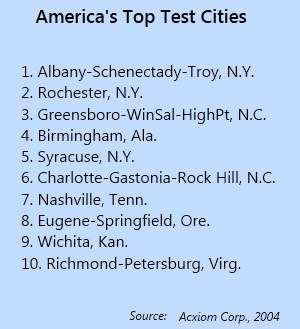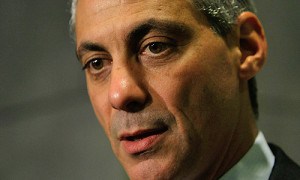
AT&T's HotZone in Charlotte only covers a tiny portion of the city, along S. Brevard Street between the NASCAR Hall of Fame and East Trade Street and for AT&T customers waiting to use the nearby Lynx light rail.
What do you do when your wireless 3G network capacity is hopelessly overloaded and you don’t want to spend the money to upgrade the network to meet the daily demands your customers place on it? You offload as much of that traffic as possible on less costly, conventional Wi-Fi network technology.
AT&T has discovered that Wi-Fi can turn an ugly congestion problem into a marketing opportunity. The company has announced free, unlimited access to its increasing number of “Hotzones” to AT&T wireless customers, promising stronger signals and faster speeds along the way. The three cities chosen for the launch of the neighborhood-blanketing Wi-Fi service are New York, Charlotte, N.C., and Chicago.
That New York and Chicago are on the list come as little surprise, but why Charlotte?
It turns out Charlotte is among the top-10 cities companies use to test market new products and services to get a better feel of how customers will react. Charlotte has served as a test market for years. FedEx used the city to test drop boxes inside U.S. post offices back in 2001. Time Warner Cable brought its “Start Over” and “Caller ID on TV” services to Charlotte to get customer reaction. AT&T first test marketed its 3G Microcell service in the area, so the company has a track record of choosing the community to test its newest offerings.
Stop the Cap! has been measuring reaction on our own to learn what Charlotte residents think about AT&T’s Hotzone.
First, many AT&T customers are still unaware that this Wi-Fi service has even made it to Charlotte. For those who have learned about it, anything that improves AT&T’s service in uptown Charlotte is good news for them.
“Although AT&T in Charlotte has never suffered from the kind of congestion faced in larger cities, when you concentrate a lot of data users in one area, such as the Time Warner Cable Arena on East Trade, AT&T’s network can slow to a crawl,” writes Stop the Cap! reader Eric, who lives in Charlotte. “I have ventured around that area several times and, to be honest, you can quietly hop on one of many business Wi-Fi hotspots for free now, but you can’t go too far before losing the signal.”
Eric says AT&T would be better off extending their Wi-Fi network across the city of Charlotte if they really want to offload 3G traffic.
“Wi-Fi is faster than their 3G service and it’s unlimited,” he notes. “I’d actually have a much more favorable impression of AT&T if they created city-wide Wi-Fi networks for their customers because it would add tremendous value and be a great reason to stick with AT&T for cell service.”
 But Liam, who works in downtown Charlotte but lives near Freedom Park writes it’s a Band-Aid for a much bigger problem — AT&T underestimating the demand on their network.
But Liam, who works in downtown Charlotte but lives near Freedom Park writes it’s a Band-Aid for a much bigger problem — AT&T underestimating the demand on their network.
“I am not sure how excited I should be about a Hotzone that runs up a street for about four city blocks,” he says. “This is not midtown Manhattan where a service like that could make a huge difference for residents of skyscraping-condos and apartment buildings. What about the rest of Charlotte?”
Liam was an AT&T customer but left for Verizon Wireless nearly a year ago. He thinks AT&T isn’t a bad provider in Charlotte — in fact he thinks AT&T does a much better job in rural western North Carolina than Verizon does, but inside metro Charlotte, Verizon’s signals are more consistent.
“If this service does reach into Time Warner Cable Arena, it could make a big difference though, especially when that stadium is nearly full,” Liam notes. “Somehow I think we’ll see Time Warner Cable’s own Wi-Fi service operating there, for free, in the not-too-distant future.”
The Charlotte Observer‘s @Charlotte blog asked readers what they thought about AT&T’s Charlotte Hotzone in two articles. Amidst a rhetorical war over the merits of AT&T and Apple’s latest iPhone, most comments welcomed the improved service, even if some are not sure exactly where that improved service can be found.
Reporter Eric Frazier wrote, “I was trying to find out for certain whether this zone will cover the office towers along Tryon Street, but a spokesperson for AT&T told me they can’t say whether specific buildings, such as the Bank of America headquarters, will or won’t be covered by the Hotzone.
Reverend Mike wants to know when he can get a Hotzone installed in his backyard, noting he was “glad to hear they are setting this up downtown.”
AT&T completed upgrades to its HSPA 7.2 network earlier this year and offers about double the potential speed its older 3G network provided Charlotte customers.


 Subscribe
Subscribe





